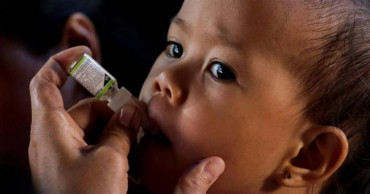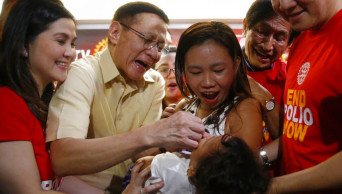Polio
New oral polio vaccine creates antibodies in unvaccinated newborns: Study
A new study by icddr,b scientists and partners published in The Lancet has shown for the first time that a novel oral polio vaccine (nOPV2) developed for use in outbreak control is safe and leads to the production of productive antibodies in newborns not exposed to any polio vaccine.
The randomised, double-blind, controlled, phase two trial was conducted in rural Bangladesh at icddr,b's Matlab Health Research Centre in Chandpur from September 21 2020 to August 16 2021.
The researchers identified women in their third trimester of pregnancy and invited them to enrol their infants in the study. It evaluated the safety and tolerability, and immunogenicity after one and two doses of nOPV2 administration at four weeks apart to the infants. The researchers also looked at some secondary outcomes.
The vaccine was found to be immunogenic, resulting in 99 percent of infants having protective neutralising antibodies. Overall, 327 received two doses of vaccine or placebo and among these 325 were tested for immunogenicity per protocol.
Read: Polio in US, UK and Israel reveals rare risk of oral vaccine
The vaccine was safe and adverse event rates were similar in the vaccine and placebo groups, icddr,b said.
Oral polio vaccines (OPVs) use live but weakened forms of the poliovirus to prime the immune system.
On rare occasions, type 2 poliovirus used in traditional OPVs can mutate and reacquire neurovirulence – the ability to cause disease of the nervous system.
Concerns about possible outbreaks of circulating vaccine-derived poliovirus type 2 (cVDPV2), led the Global Polio Eradication Initiative to withdraw type 2 poliovirus from OPVs and target only types 1 and 3.
The UN health agency recently authorised the use of a new OPV against type 2 poliovirus called nOPV2, which is less likely to revert to neurovirulence. However, the vaccine had only previously been tested on individuals who had received at least one dose of the inactivated polio vaccine (IPV), which is less effective than OPVs at preventing transmission of the virus.
"So, the findings of this new study will equip public health experts and policymakers with the evidence to inform the use of nOPV2 in newborns with no previous exposure to other polio vaccines, who constitute the most vulnerable group for polio transmission," icddr,b said.
Dr K Zaman, senior scientist at the Infectious Diseases Division at icddr,b, who led the study, said: "The novel oral polio vaccine is safe and immunogenic in the age group that most needs to be vaccinated to stop the chain of polio transmission in at-risk communities."
Read: Pakistani PM kicks off nationwide anti-polio campaign as new cases emerge
"This information is particularly welcome given that over 450 million doses have already been distributed under the World Health Organization Emergency Use Listing procedure, with no age restrictions for recipients."
"Our study supports the continued use of the vaccine. However, there is still no data on how nOPV2 may interfere with the Bivalent Oral Poliomyelitis Vaccine, the currently approved oral vaccine targeting types 1 and 3 poliovirus," Dr K Zaman said.
Preventing the transmission of vaccine-derived poliovirus by vaccinating vulnerable vaccine-naïve newborns with nOPV2 is likely to be a key step toward poliovirus eradication.
3 years ago
Polio in US, UK and Israel reveals rare risk of oral vaccine
For years, global health officials have used billions of drops of an oral vaccine in a remarkably effective campaign aimed at wiping out polio in its last remaining strongholds — typically, poor, politically unstable corners of the world.
Now, in a surprising twist in the decades-long effort to eradicate the virus, authorities in Jerusalem, New York and London have discovered evidence that polio is spreading there.
The original source of the virus? The oral vaccine itself.
Scientists have long known about this extremely rare phenomenon. That is why some countries have switched to other polio vaccines. But these incidental infections from the oral formula are becoming more glaring as the world inches closer to eradication of the disease and the number of polio cases caused by the wild, or naturally circulating, virus plummets.
Since 2017, there have been 396 cases of polio caused by the wild virus, versus more than 2,600 linked to the oral vaccine, according to figures from the World Health Organization and its partners.
“We are basically replacing the wild virus with the virus in the vaccine, which is now leading to new outbreaks,” said Scott Barrett, a Columbia University professor who has studied polio eradication. “I would assume that countries like the U.K. and the U.S. will be able to stop transmission quite quickly, but we also thought that about monkeypox.”
The latest incidents represent the first time in several years that vaccine-connected polio virus has turned up in rich countries.
Earlier this year, officials in Israel detected polio in an unvaccinated 3-year-old, who suffered paralysis. Several other children, nearly all of them unvaccinated, were found to have the virus but no symptoms.
In June, British authorities reported finding evidence in sewage that the virus was spreading, though no infections in people were identified. Last week, the government said all children in London ages 1 to 9 would be offered a booster shot.
In the U.S., an unvaccinated young adult suffered paralysis in his legs after being infected with polio, New York officials revealed last month. The virus has also shown up in New York sewers, suggesting it is spreading. But officials said they are not planning a booster campaign because they believe the state's high vaccination rate should offer enough protection.
Genetic analyses showed that the viruses in the three countries were all “vaccine-derived,” meaning that they were mutated versions of a virus that originated in the oral vaccine.
The oral vaccine at issue has been used since 1988 because it is cheap, easy to administer — two drops are put directly into children's mouths — and better at protecting entire populations where polio is spreading. It contains a weakened form of the live virus.
Read:WHO updates Covid strategy to vaccinate all health workers, vulnerable groups
But it can also cause polio in about two to four children per 2 million doses. (Four doses are required to be fully immunized.) In extremely rare cases, the weakened virus can also sometimes mutate into a more dangerous form and spark outbreaks, especially in places with poor sanitation and low vaccination levels.
These outbreaks typically begin when people who are vaccinated shed live virus from the vaccine in their feces. From there, the virus can spread within the community and, over time, turn into a form that can paralyze people and start new epidemics.
Many countries that eliminated polio switched to injectable vaccines containing a killed virus decades ago to avoid such risks; the Nordic countries and the Netherlands never used the oral vaccine. The ultimate goal is to move the entire world to the shots once wild polio is eradicated, but some scientists argue that the switch should happen sooner.
“We probably could never have gotten on top of polio in the developing world without the (oral polio vaccine), but this is the price we’re now paying,” said Dr. Paul Offit, director of the Vaccine Education Center at the Children’s Hospital of Philadelphia. “The only way we are going to eliminate polio is to eliminate the use of the oral vaccine."
Aidan O’Leary, director of WHO's polio department, described the discovery of polio spreading in London and New York as “a major surprise,” saying that officials have been focused on eradicating the disease in Afghanistan and Pakistan, where health workers have been killed for immunizing children and where conflict has made access to some areas impossible.
Still, O'Leary said he is confident Israel, Britain and the U.S. will shut down their newly identified outbreaks quickly.
The oral vaccine is credited with dramatically reducing the number of children paralyzed by polio. When the global eradication effort began in 1988, there were about 350,000 cases of wild polio a year. So far this year, there have been 19 cases of wild polio, all in Pakistan, Afghanistan and Mozambique.
In 2020, the number of polio cases linked to the vaccine hit a peak of more than 1,100 spread out across dozens of countries. It has since declined to around 200 this year so far.
Last year, WHO and partners also began using a newer oral polio vaccine, which contains a live but weakened virus that scientists believe is less likely to mutate into a dangerous form. But supplies are limited.
To stop polio in Britain, the U.S. and Israel, what is needed is more vaccination, experts say. That is something Columbia University's Barrett worries could be challenging in the COVID-19 era.
“What’s different now is a reduction in trust of authorities and the political polarization in countries like the U.S. and the U.K.,” Barrett said. “The presumption that we can quickly get vaccination numbers up quickly may be more challenging now.”
Oyewale Tomori, a virologist who helped direct Nigeria’s effort to eliminate polio, said that in the past, he and colleagues balked at describing outbreaks as “vaccine-derived,” wary it would make people fearful of the vaccine.
“All we can do is explain how the vaccine works and hope that people understand that immunization is the best protection, but it’s complicated,” Tomori said. “In hindsight, maybe it would have been better not to use this vaccine, but at that time, nobody knew it would turn out like this.”
3 years ago
Malaysia vaccinating for polio after first case in 27 years
Malaysia began a vaccination campaign in a rural town on Borneo island after a 3-month-old boy was confirmed to have polio in the country's first case of the highly infectious virus in 27 years.
6 years ago
More polio cases now caused by vaccine than by wild virus
Four African countries have reported new cases of polio linked to the oral vaccine, as global health numbers show there are now more children being paralyzed by viruses originating in vaccines than in the wild.
6 years ago
Philippines confirms 2nd polio case after declaring outbreak
Manila, Sep 20 (AP/UNB) — Philippine health officials on Friday confirmed a second case of polio in a 5-year-old child a day after declaring the country's first outbreak in nearly two decades, and announced plans for a massive immunization program.
6 years ago








